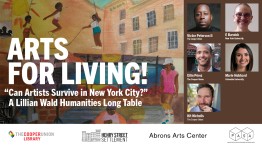Arts for Living!
Tuesday, April 8, 2025, 12 - 2pm

PASA, a faculty-led initiative to revive The People’s Institute at The Cooper Union, is hosting a Long Table in The Cooper Library that addresses "Can artists survive in New York City?," which is this year's Lillian Wald Symposium theme. The event is in a collaboration between The Cooper Union Library and Henry Street Settlement. Register here.
The conversation will explore the question, “Can those involved in creative practice, regardless of discipline or field, survive in NYC?” as a lead-up to the annual Lillian Wald Symposium at Henry Street Settlement's Abrons Arts Center on April 9, 6 - 8 p.m.
Born out of the collective research and collaborative efforts of a faculty reading group and engagement with the communities within which those members were already placed, this long table discussion, in anticipation of the Lillian Wald Symposium at Abrons Art Center, Henry Street Settlement, is the first installment in an effort to revitalize a connection through The Cooper Union Library with Henry Street in honor of one of The People’s Institute’s founding members, Lillian Wald, founder of Henry Street Settlement. This long table discussion will be facilitated by the following friends of PASA: Victor Peterson II, E Barnick, Eilin Pérez, Marie Hubbard, and Kit Nicholls.
Victor Peterson II is an assistant professor of the Humanities and Social Sciences at The Cooper Union. Hailing from Philadelphia, Pennsylvania, Peterson's work in Black Cultural Studies develops articulation theory: how relations of dominance and subordination emerge and evolve through and against the networks of norms and institutions that structure sociocultural and political movements. Currently, Peterson's working on a book project positing a relation between sound and movement that utilizes mosh pits as a model to analyze socio-cultural formations as complex adaptive systems in alignment with Black scholars' theorizing these movements as collective improvisations.
E Barnick is a Ph.D. candidate in performance studies at New York University studying the intersection of image making, carceral epistemologies, and collective creative practice. Their research focuses on imaging as a site of rehearsal for sense making in community, and as a practice of community that de/recomposes relationships to harm. They received their B.A. in theater and performance studies from Stanford University and they have worked for several years as a performance facilitator and rehearsal enthusiast.
Eilin Rafael Perez is a historian of modern Korea specializing in diplomacy and decolonization in the Cold War. His current book project examines histories of cultural production that emerged out of engagement between North Korea and solidarity movements of the global South. The project reconsiders traditional Area Studies boundaries by highlighting the networks of information exchange and dissemination developed among anti-imperialist actors across the globe. Perez’s research has been generously supported by the CLIR/Mellon Fellowship for Dissertation Research in Original Sources; by several Foreign Language and Area Studies Fellowships; and by the Mellon Mays Undergraduate Fellowship. Raised in Queens, New York, he is now Visiting Assistant Professor of History in the Faculty of the Humanities and Social Sciences at The Cooper Union. Perez previously served as postdoctoral associate in History and Public Humanities at Yale University. He completed a Ph.D. in history at the University of Chicago after receiving a B.A. in Asian Studies and History with honors from Williams College.
Marie Hubbard is a Ph.D. student in English and comparative literature, and an affiliate of the Institute for Comparative Literature and Society. She earned her B.A. in English with honors at Stanford University in 2015. Hubbard specializes in postcolonial Anglophone and Francophone literatures. She is interested in the circulation of literature in imperial contexts and the cultural formation of colonial subjects, with a particular focus on the history of colonial schooling. Her current work draws on her research background in European imperialism to study 20th century U.S. imperialism and the transnational circulation of literature in the Cold War period. Broadly, Hubbard’s scholarship is concerned with a paradox of literature’s production and transmission: that literature has historically been used to reproduce social inequality, especially in the colonial context, while at the same time it has been used as a tool of liberation. ,
Kit Nicholls received a Ph.D. in English at New York University and a B.A. in creative writing at the University of Michigan, Ann Arbor. He is co-author, with William Germano, of Syllabus: The Remarkable, Unremarkable Document That Changes Everything (Princeton University Press, 2020), and his essays have appeared in venues such as European Romantic Review, The Chronicle of Higher Education, and Psyche.
Located at 7 East 7th Street, between Third and Fourth Avenues




